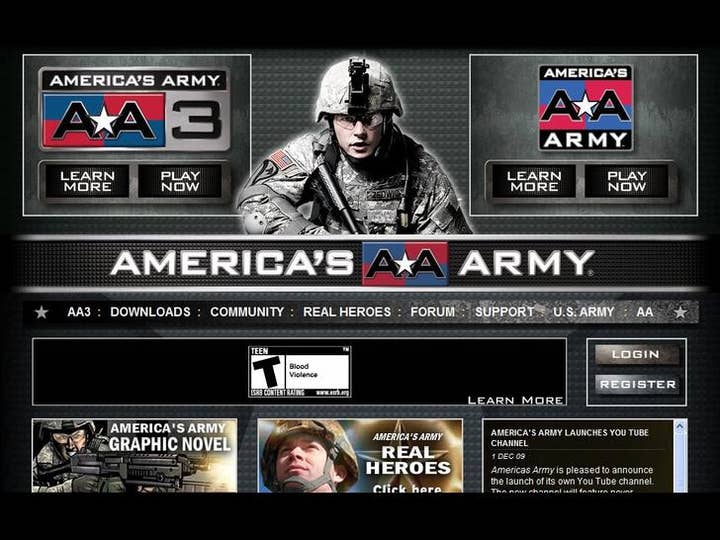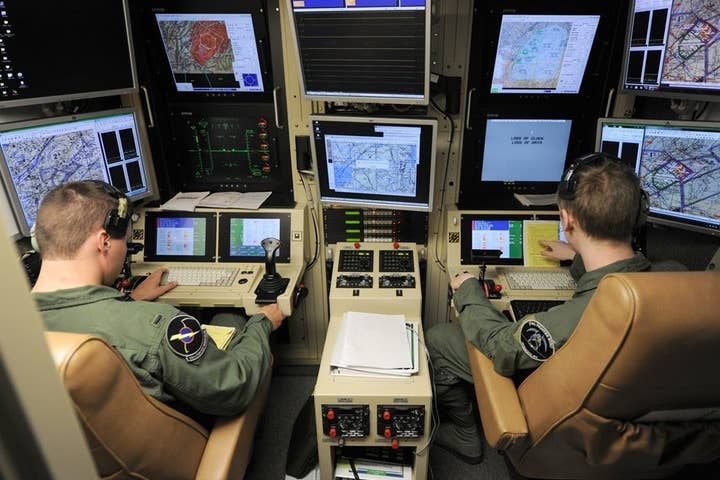War Games: the link between gaming and military recruitment
"Skillsets" of young players still sought by US and European forces
The idea of games' involvement in military recruitment is nothing new. America's Army, the FPS platform developed by the US military, has been available, for free, since 2002 - spearheading the use of virtual environments to prime young people for enlistment. It's marketed as way for youngsters to explore the possibility of a military career at their own pace, a way to test their mettle in a safe environment, but it was also one of the first experiments in exploring the correlation between the skills developed in modern gaming and those needed on the battlefield.

As games, particularly in the FPS genre, become more realistic and politically charged, they've become open to more direct interpretation as primers for some of the realities of war. America's Army might be the only official training and recruitment tool, but the likes of ARMA could certainly be argued to supersede it in terms of realism. Whilst nobody who's played Call of Duty or Battlefield expects to recover from a real-life assault rifle round to the chest by crouching momentarily behind a wall, huge numbers of young people are developing an in-depth knowledge of military hardware, vocabulary and basic technique. I'm not of the belief that this sort of exposure is likely to turn anyone into a killer, or even belittle their perception of the value of human life in any meaningful way, but spending hours honing reaction times and target acquisition responses is certainly something in which the military sees value, however far removed the training may have been from the reality.
It's not something that the forces make a secret of, either. Recruitment is a difficult task, with generally low pay rates and the very real risk of serious injury or death compounded by a high drop-out rate among those who do sign up. Finding a rich substrate of young people with an interest in the military, with particular skills and who already see themselves as talented and engaged is something that the armed forces simply cannot ignore. In addition to programs like America's Army, it's become increasingly common to see an open military recruitment presence at public-facing trade shows, with assault courses, aptitude tests and sign-up forms all in attendance.
"We don't need Top Gun pilots any more, we need Revenge of the Nerds"
Missy Cummings, former US Navy Pilot, Assos. Prof. of Aeronautics, MIT.
The dissonance between sitting on a sofa, using a controller to play Call of Duty and being on patrol in an operational area, carrying 30 pounds of kit and a real firearm is obvious. There's a huge disconnect, and it's in no way true to claim that playing an FPS will turn someone into a soldier. However, there is an area of warfare, one which is rapidly becoming increasingly prevalent, which bears much more than a superficial similarity to a gaming experience: drone piloting.
Since 2004, America's use of drones to attack what it believes to be terrorist targets has multiplied enormously. Over 3,000 people are estimated to have been killed by drone munitions in Pakistan alone in that time, including 175 children and over 500 civilian adults. The value of a drone's ability to patrol vast distances at a relatively low cost whilst presenting no danger to their operators is clear, and collateral damage is unlikely to slow their proliferation.
The idea that the remote piloting of these unmanned aircraft is 'like a game' isn't new either. Servicemen have compared it directly to Call of Duty, whilst others have insisted it's nothing of the sort. In fact, some studies have suggested that the high-intensity experiences of playing online shooters can leave gamers poorly equipped for the long and often completely uneventful sorties of drone piloting, unable to maintain concentration during long periods of activity and consequentially missing what are chillingly described as "actionable occurrences" when they do appear.
"Despite being remote from the battle space they exhibited a strong sense of connection to the life and death decisions they are sometimes required to take. This was in stark contrast to the image portrayed by some commentators of 'drone' pilots as video gaming 'warrior geeks'"
UK Committee on drone operations
Nonetheless, the military is still persevering with the recruitment of players, and not just in the US. Documentary maker Tonje Hessen Schei says she has witnessed military recruiters in countries like Sweden and Norway attending large LAN events and speaking to children as young as 12 about a future as a drone pilot. She also says that the military regularly consults with the gaming industry on how best to design the UI for drones, asking what might be the most familiar and comfortable methods of control and information presentation for a generation raised on virtual warfare. PlayStation and Xbox controllers have been used to create interfaces, blurring the line between fiction and fatality yet further. The military, it seems, is quite happy marketing real-life killing as a game.
Speaking to various ex-pilots, Schei finds that many of them have strong gaming links, and that games were certainly part of the recruitment process. The reality, however, quickly proves to be radically different, with these young men often falling foul of the same PTSD and overwhelming guilt which affects many who see engagement. Particularly troubling for many of them is the utilisation of the "double-tap" method. Double Tapping is the firing of a secondary munition at a target site moments after the first in an attempt to kill those who come running to assist the wounded, making the deaths of innocents a near certainty. As her interviewees explain, those shadows and flashes on the monitor quickly become directly equatable to the bodies lying in the dust ten thousand miles away.
Schei's documentary, DRONE, was released last Autumn. It's not entirely related to the association between gaming and military recruitment, but there's a considerable focus, as you can see from the extract below prepared by the Guardian.
So what responsibilities, if any, does the games industry bear in this regard? War games aren't going away, and nor should they. There is no call here to censor content or eradicate one of the industry's most profitable genres. As I've already said, I don't think games make people violent. I fulminate and fume every time I see a lazy tabloid headline which conflates the perpetrator of a crime owning a game with that game being directly responsible for their conduct. Games don't make killers, killers just sometimes play games.
Perhaps what there could be more of, though, is a representation of the true cost of war and killing. Of the inevitability of the deaths of innocents, of the terror and the horror and the grim brutality of war. I've pulled enough dog-tags from the necks of online opponents to know how intoxicating, how cathartic, the thrill of the glamorisation of war can be - it's presented me with some of my most memorable and enjoyable gaming moments - but I've also had the experience of switching the news on after an afternoon in Battlefield and seeing footage of the dead, the dismembered and the dispossessed. Too often, in a country far, far away, a real-life version of the pantomime warfare I've been conducting is playing out with terrible consequences.
I've felt very real guilt at that, at how much I've enjoyed that make-believe slaughter. I've felt discomfort as the storylines of modern shooters fade ever more indistinguishably into the headlines. Spec Ops: The Line, played that card directly, creating a singularly effective and disarming experience which I've never quite seen matched. Even CoD has chanced its arm at portrayals of the less palatable aspects of systematic murder, so there a examples out there which prove that you don't have to gloss over the bad bits to make a successful, enjoyable game. Perhaps, if we are truly going to be preparing future generations for a life of service, then we need to ensure that they're prepared for the aftermath as well as the achievements.

